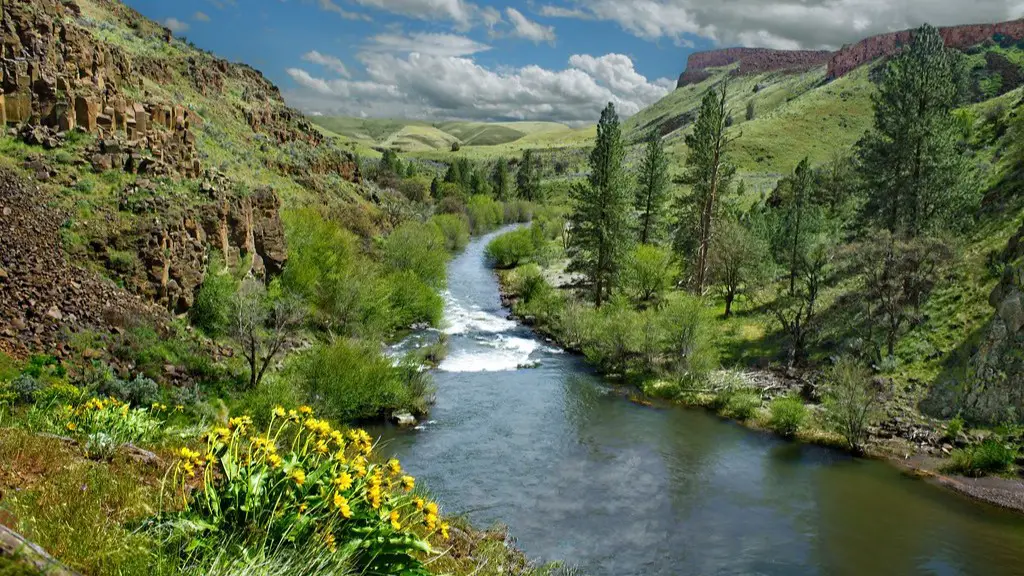Flood stage on the Mississippi River is the point at which flooding of adjacent land and other areas begins. The flood stage is determined variously by the U.S. Army Corps of Engineers, U.S. Geological Survey, and the National Weather Service, dependent on the location. The Mississippi River has two distinct sections in which flood staging can be defined, the upper Mississippi Valley and the lower Mississippi Valley. At any given section of the Mississippi River, the water stage is the height of the water in relation to the surrounding ground. Since the Mississippi is a large and incredibly varied river, flood stages and their significance vary greatly.
The flood stage indicates the point at which waters begin inundating areas in the surrounding area. Depending on the location and expected volume of water, this level of flooding can have very different impacts. In some sections, minor flooding is expected and only has a small effect on land usage and conditions. However, in other areas this could lead to destructive flooding on a massive scale.
The National Weather Service of the United States is responsible for monitoring water levels in rivers and streams, including the Mississippi. On the upper Mississippi River, the U.S. Army Corps of Engineers is responsible for determining flood stages as alert levels to inform the public of the potential for flooding. By studying the amount of rainfall and runoff, experts are able to track the rise and fall of the river, informing the public of when they could expect flooding.
In the lower Mississippi River, the U.S. Geological Survey (USGS) aids in flood stage reporting by providing data on the river level. The USGS also collects additional data such as concerning the river’s conductivity and general water quality, which is used to establish flood stages and alert levels. While the USGS measures the height of the Mississippi River by taking measurements at different sites, the Army Corps of Engineers is responsible for recording the actual impact of the river’s increase in height on adjacent land.
The impact of flooding on the Mississippi River is quite varied from section to section. While some areas see flooding on a regular basis and in certain areas, areas along the upper Mississippi Valley may only experience flooding at certain times of the year. As such, the flooding stages and their related impacts should not be taken lightly, as they vary remarkable and can change quickly.
Flooding Affects Along the Mississippi
The potential for flooding on the Mississippi River varies from location to location, but one thing remains: flooding has an immense impact on the areas close to the river. Inhabitants of the area are all too aware of the potential for disaster that flooding brings, and for this reason, flood stages need to be taken seriously.
When the water levels on the Mississippi River reach flood stage, the people living in the areas along the riverbank are at risk of losing their homes and workplaces. Not only can flooding destroy buildings and property, but it can also create hazardous conditions by inundating roads, bridges, and other travel routes. Floods can also cause extensive agricultural damage and contaminate drinking water and other resources.
As flooding on the Mississippi River has a particularly heavy impact, the U.S. Army Corps of Engineers is working to ensure adequate warning of flooding stages on the above average Mississippi River. By working with the National Weather Service and other experts, they are able to predict when flooding may occur, giving areas upstream an opportunity to prepare.
Flood Stages on the Mississippi – Knowing Your Risks
Knowing your risk level for flooding is essential for those living near the Mississippi River. Choosing the right location for your home and business is key in managing potential damage from flooding. That being said, the potential for flooding on the Mississippi is quite low in comparison to other rivers of its size. The National Weather Service is a great resource for staying informed about river levels, so be sure to utilize it frequently.
Additionally, if you’re looking to develop a piece of land adjacent to the Mississippi River, be sure to investigate both its flood history and estimated future risk level. Doing so can save you a lot of money and heartache in the long run.
The Mississippi provides some unique opportunities for those willing to take the risk. Although the flooding risk is always present, proper precautions and due diligence can assure that you are well prepared if and when it does occur. Knowing your flood stages on the Mississippi can go a long way in helping you make decisions on where to live, work, and play.
Flood Control On The Mississippi
Analysis of historical flooding on the Mississippi have revealed a need for systems to help contain and control the waters during peak times. Research has been done to identify areas that pose the greatest risk of flooding, enabling experts to find solutions. This involves a variety of interventions, including land acquisition, major construction projects, and implementation of flood protection systems.
Additionally, the U.S. Army Corps of Engineers is working to develop policies to help mitigate the effects of flooding. One particular policy they are working on is known as “Release and Delay,” in which the Army Corps releases certain volumes of water upstream to reduce the risk of flooding in more vulnerable downstream locations. The success of this policy is still being debated.
Ultimately, the Mississippi River is much too big and complex for any single policy or solution to handle. Rather, multiple strategies are needed to both mitigate and respond to potential flooding. The importance of flood staging on the Mississippi is increasingly apparent, and it is up to all of us to work together to help develop policies and mechanisms to control flooding.
Economic Effects of Flooding on The Mississippi
Flooding on the Mississippi River has had an undeniably negative impact on the region’s economy. Flooding can lead to extensive destruction of roads, bridges, and infrastructure, resulting in loss of commerce. The destruction of businesses in downtown and along the river can lead to a severe setback in economic progress. On top of economic destruction, flooding has also had a heavy effect on employment in the region, resulting in hundreds of jobs lost.
Furthermore, crop damage resulting from flooding can lead to severe losses in the agricultural sector. Agricultural products are essential to the Mississippi’s economy and flooding can lead to crops being destroyed, leading to significantly lower income than expected. Additionally, all of this destruction can directly lead to a dramatic decrease in property values, costing potential homeowners and investors billions of dollars each year.
The economic effects of flooding can have far-reaching impacts for residents of the Mississippi River region. On an individual level, people can find themselves out of work, struggling with food insecurity, and unable to continue with their everyday lives. On the larger scale, long-term economic growth in the region can be heavily disrupted, derailing the progress made in previous years.
How To Prepare and Protect From Flooding
Living on the Mississippi River carries a certain risk and it is important to know how to best prepare and protect your home and family in the event of an emergency. One of the best ways to protect your family is to understand your risks and stay informed. Checking river levels and traffic patterns may provide an idea of how close to flood risk your home is. Additionally, staying up-to-date on evacuation and warning systems can help keep your family informed and ready if and when the need arises.
Additionally, having a plan in place is essential. Knowing where to go and what to do can make all the difference in an emergency. Making sure everyone knows where to meet and having snacks and water readily available can ease the stress on all involved. Removing valuables from the ground if flooding is imminent might prevent irreplaceable losses.
Finally, it is a good idea to contact local officials or your insurance company is you are living or building near the Mississippi River. These people can provide advice and assistance on how to best protect your family and property from the potential for flooding.




